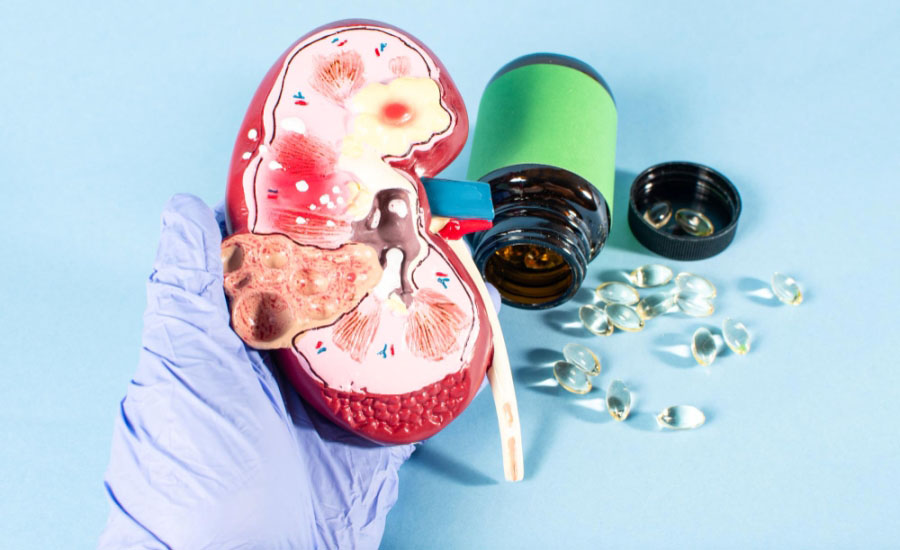Drug use is hard on the body in many ways, especially for the organs involved in processing and removing substances from the body.
One of the organs that’s often affected is the kidneys. For instance, a cross-sectional analysis that reviewed over 5,800 adults who struggled with illicit drug use found a significant connection between drug use and chronic kidney disease. Therefore, your kidney health is important to consider after ongoing substance abuse.
How do you support kidney health after drug use? We’ve put together this guide to help, with a focus on natural, evidence-based strategies to improve your well-being for the long term. Keep reading as we discuss all the details.
How Drug Use Affects the Kidneys
After you take drugs, they eventually need to be processed and removed from the body. The key functions of the kidneys are filtering waste and balancing the body’s fluids through the urine.
What happens is you’ll take drugs and they’ll flow through the bloodstream until they get to the liver. Next, the liver processes them for removal from the body. Then, they’ll go to the kidneys, which remove the substance in the urine.
However, when you take drugs for an extended time or in high doses, they can cause strain or damage to the kidneys. After all, substances such as cocaine, opioids, or MDMA are toxic to the body, so organs like the kidneys have to work hard to handle and remove them. That’s why there’s a strong connection between kidney disease and drug use.
Signs Your Kidneys May Need Support
The National Kidney Foundation outlines several signs of kidney damage. Those include:
- Less energy or problems concentrating
- Dry or itchy skin
- Insomnia
- Urinating more often
- Excessive foam in the urine
- Blood in the urine
- Swollen feet or ankles
- Puffiness around the eyes that doesn’t go away
- Muscle cramping
- Poor appetite
As kidney problems get worse, you may have these symptoms get more serious or more noticeable. They act as signs from the body that you need kidney health recovery and to stop using drugs before damage to the kidneys becomes more severe.
Fortunately, there are steps that can help when you’re wondering how to heal the kidneys naturally.
Best Natural Ways to Support Kidney Health
Some ways you can improve kidney function after drugs are:
Staying Hydrated
Research shows that drinking enough water is crucial for kidney health, function, and recovery. Staying hydrated will help in a few important ways:
- It promotes urination to remove waste and toxins from the bloodstream
- It keeps the blood vessels open to improve kidney function
- When blood vessels are open, it’s easier for the body to carry good nutrients to the kidneys
Eat a Balanced Diet
When you eat a balanced diet full of nutritious foods such as fruits and leafy green vegetables, it provides your body with many good vitamins, minerals, and antioxidants to support healing. That way, you give your body a good environment to heal while recovering from kidney problems or detoxing after drug abuse.
Avoid Substance Use
Avoid using recreational drugs or drinking alcohol while recovering from kidney damage. Continuing to use drugs or drink, even in small amounts, can prevent the body from healing and make the problem worse.
Additionally, it’s often a good idea to limit caffeine intake and the use of over-the-counter painkillers such as NSAIDs like Ibuprofen or Aspirin, since they also affect the kidneys.
Exercise
The American Kidney Fund recommends that people with chronic kidney disease or kidney damage get at least 150 minutes of moderate-intensity exercise each week. Exercising enough will improve circulation and overall organ function, which can support healing during recovery.
Get Enough Sleep
Sleep is necessary for the body to heal, so make sure you’re sleeping enough during a natural kidney detox to support your recovery.
It often helps to practice good sleep hygiene, such as going to bed and waking up at the same time each day, keeping your sleeping environment quiet and comfortable, and avoiding using electronics right before bed. This will help build good habits that keep you healthy and sleeping well for the long term.
What to Avoid
Some of the important things to avoid are any kidney cleanses, unproven supplements, or crash diets that claim they’re quick fixes to improve kidney health.
It takes the body time to heal and recover after drug use and damage to the kidneys have occurred, so anything that claims to offer an immediate fix probably won’t have the results you’re hoping for.
Additionally, some cleanses or supplements could actually end up being hard on the body and the kidneys if there isn’t much (or any) research about their safety. Therefore, make sure you’re sticking with evidence-based treatment options recommended by healthcare professionals based on your needs.
When to Seek Medical Help
Some signs of serious kidney damage that require immediate medical help include:
- Blood in the urine
- Vomiting
- Shortness of breath or breathlessness
- Extreme muscle cramps
- Having a swollen face or feet
- Worsening fatigue
When these symptoms are coupled with substance abuse, it should serve as a wake-up call that you need to make changes before worse damage occurs. Continuing to use drugs after kidney issues start to arise can lead to permanent damage, so it’s important to take action early.
Fortunately, when you do take action and seek the right treatment for kidney health and addiction, you can recover and improve your well-being for the long term.
How Genesis Health Supports Recovery and Long-Term Health
Our team at Genesis Health is here to help with evidence-based treatment options for drug and alcohol addiction.
We offer medical detox, inpatient rehab, and outpatient rehab options that are tailored to your individual needs. Our knowledgeable treatment staff can provide you with a diagnosis and build a plan that supports overall health, continued sobriety, and monitors conditions such as kidney problems to ensure safety during treatment.
You can get started with a confidential consultation to learn more about our treatment options and how we can help.
Recovery is possible. Get in touch with us today to take the first step.
References
- Akkina, Sanjeev K., et al. “Illicit Drug Use, Hypertension, and Chronic Kidney Disease in the US Adult Population.” Translational Research, vol. 160, no. 6, Dec. 2012, pp. 391–398, doi:10.1016/j.trsl.2012.05.008. https://pmc.ncbi.nlm.nih.gov/articles/PMC3461092/
- Garza, Aaron Z., et al. “Drug Elimination.” PubMed, StatPearls Publishing, 2023, https://www.ncbi.nlm.nih.gov/books/NBK547662/
- National Kidney Foundation. “10 Signs You May Have Kidney Disease.” National Kidney Foundation, 12 Aug. 2024, https://www.kidney.org/news-stories/10-signs-you-may-have-kidney-disease
- National Kidney Foundation. “Healthy Hydration and Your Kidneys.” National Kidney Foundation, 13 Aug. 2024, https://www.kidney.org/kidney-topics/healthy-hydration-and-your-kidneys
- American Kidney Fund. “Physical Activity and Kidney Health.” American Kidney Fund, 15 May 2024, https://www.kidneyfund.org/living-kidney-disease/physical-activity-and-kidney-health






